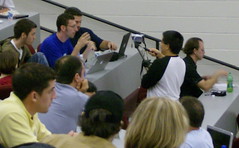Learning questions of synergy
Are you ready?
I hope so.
Rosa's first question:
How will our LEARNING STYLES and HABITS have to EVOLVE so that the web communications of our future serve to POWER partnerships, teams, groups and communities?
I think the key to this is our respect for the individual. The web communications are done with tools of technology: instant messaging (IM), voice over IP, email, blog, video blog, podcasting, wikis, etc. There are plenty of tools. But they are only tools. They still require people to operate and use them. We must be mindful that there is another person on the other end and they may not be as adept at the tool as we are. We must be mindful of the verbal communication studies that show 15% of the actual communication is in the words we use, another 20% in the tone of our voice, and 55% in our body language. When we do email or IM, it is only the text that is present. When video phones become common, then the body and facial expressions can come back into the picture to help convey the message.
Until then, be kind to one another.
Confirm what is being said/written, so you do not go off having half heard something.
There is more in common amongst us than there are differences. We need to be kind and patient to explore each other to let this come out into the open.
I heard (via Steve Garfield's field report on Rocketboom) Jeff Jarvis say that the battle between distribution and content was wrong, the conversation is the kingdom and trust is the king.
We need to get to a position of trust with one another in order to succeed together.
It won't be easy. But therein lies the challenge!
Question 2
Question 3
Question 4
Question 5
Technorati Tags : learning, synergy, trust, conversation, content, distribution

